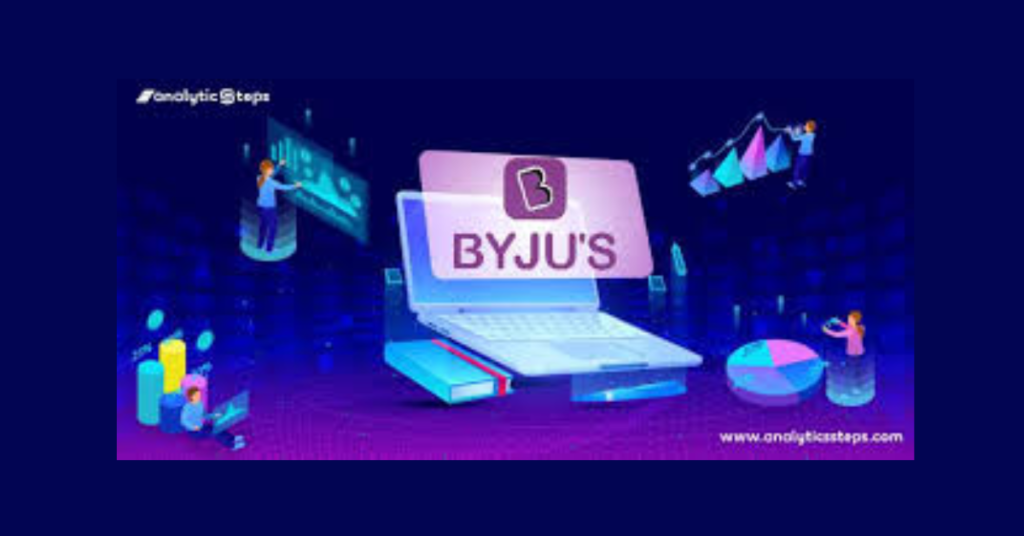1. Byju’s

Summary:
Byju’s is India’s largest and most well-known e-learning platform offering personalized learning programs for students from kindergarten to 12th grade (K-12) and competitive exams like JEE, NEET, CAT, etc. It uses engaging video lessons and interactive quizzes to make learning effective and enjoyable.
Table:
| Aspect | Details |
|---|---|
| Founders | Byju Raveendran |
| Founded | 2011 |
| Headquarters | Bangalore, India |
| Sector | E-learning |
| Focus Area | K-12 Education, Test Preparation |
| Notable Features | Personalized learning journeys, adaptive learning content, gamified quizzes |
| Key Customers | Students, Parents, Schools |
| Funding Status | Series funding rounds completed |
2. Unacademy

Summary:
Unacademy is a learning platform that provides online classes and courses for various competitive exams, including UPSC, SSC, IIT-JEE, NEET, and more. It also offers educational content through live classes, recorded videos, and test series.
Table:
| Aspect | Details |
|---|---|
| Founders | Gaurav Munjal, Roman Saini, and Hemesh Singh |
| Founded | 2015 |
| Headquarters | Bangalore, India |
| Sector | E-learning |
| Focus Area | Competitive Exams, Skill Development |
| Notable Features | Live classes, interactive quizzes, educator-led content |
| Key Customers | Students preparing for competitive exams, Working professionals |
| Funding Status | Series funding rounds completed |
3. Vedantu

Summary:
Vedantu is an online tutoring platform that offers live interactive classes for students in grades 1 to 12 (K-12), as well as preparation for exams like JEE, NEET, CBSE, ICSE, etc. It provides personalized learning with a focus on small group classes.
Table:
| Aspect | Details |
|---|---|
| Founders | Vamsi Krishna, Pulkit Jain, Saurabh Saxena |
| Founded | 2011 |
| Headquarters | Bangalore, India |
| Sector | E-learning |
| Focus Area | Live Tutoring, Test Preparation |
| Notable Features | Interactive whiteboard, two-way audio-video, doubt-solving sessions |
| Key Customers | Students, Parents, Schools |
| Funding Status | Series funding rounds completed |
4. UpGrad

Summary:
UpGrad is an online higher education platform offering courses in collaboration with universities and industry partners. It focuses on providing upskilling and reskilling opportunities in fields like data science, management, digital marketing, etc.
Table:
| Aspect | Details |
|---|---|
| Founders | Ronnie Screwvala and Mayank Kumar |
| Founded | 2015 |
| Headquarters | Mumbai, India |
| Sector | E-learning, Higher Education |
| Focus Area | Professional Development, Upskilling |
| Notable Features | University partnerships, industry-relevant curriculum, mentorship |
| Key Customers | Working professionals, Corporates, Educational institutions |
| Funding Status | Series funding rounds completed |
5. Toppr

Summary:
Toppr is an adaptive learning platform catering primarily to K-12 students. It offers personalized learning paths, adaptive practice questions, and test series for various school curriculum boards and competitive exams like JEE, NEET, AIIMS, etc.
Table:
| Aspect | Details |
|---|---|
| Founders | Zishaan Hayath and Hemanth Goteti |
| Founded | 2013 |
| Headquarters | Mumbai, India |
| Sector | E-learning |
| Focus Area | K-12 Education, Test Preparation |
| Notable Features | Adaptive learning algorithms, mock tests, performance analytics |
| Key Customers | Students, Parents, Schools |
| Funding Status | Series funding rounds completed |
6. Simplilearn
Summary:
Simplilearn is an online training provider offering certification courses in disciplines like IT, project management, digital marketing, data science, and cybersecurity. It caters to professionals seeking skill enhancement and career advancement.
Table:
| Aspect | Details |
|---|---|
| Founders | Krishna Kumar |
| Founded | 2009 |
| Headquarters | Bangalore, India |
| Sector | E-learning, Professional Development |
| Focus Area | Certification Courses, Skill Enhancement |
| Notable Features | Self-paced learning, industry-aligned curriculum, live virtual classrooms |
| Key Customers | Professionals, Corporates |
| Funding Status | Series funding rounds completed |
7. Byju’s Future School

Summary:
Byju’s Future School is an online platform that offers personalized coding and math lessons for students aged 6-18. It focuses on nurturing critical thinking and problem-solving skills through interactive classes.
Table:
| Aspect | Details |
|---|---|
| Founders | Byju Raveendran |
| Founded | 2021 |
| Headquarters | Bangalore, India |
| Sector | E-learning |
| Focus Area | Coding, Mathematics |
| Notable Features | Live online classes, one-on-one sessions, adaptive learning paths |
| Key Customers | Students, Parents |
| Funding Status | Not specified |
8. Testbook

Summary:
Testbook is an e-learning platform that provides online coaching for competitive exams in India, including banking, railways, SSC, teaching, and more. It offers live classes, mock tests, and exam-specific content.
Table:
| Aspect | Details |
|---|---|
| Founders | Ashutosh Kumar and Narendra Agrawal |
| Founded | 2014 |
| Headquarters | Mumbai, India |
| Sector | E-learning |
| Focus Area | Competitive Exams Preparation |
| Notable Features | Exam-specific content, mock tests, performance analysis |
| Key Customers | Aspirants of competitive exams |
| Funding Status | Series funding rounds completed |
9. Talentedge
Summary:
Talentedge offers online executive education programs in collaboration with top institutes and universities. It specializes in courses for working professionals seeking skill enhancement in management, finance, and other domains.
Table:
| Aspect | Details |
|---|---|
| Founders | Aditya Malik |
| Founded | 2012 |
| Headquarters | Gurgaon, India |
| Sector | E-learning, Executive Education |
| Focus Area | Online Certification Courses, Skill Development |
| Notable Features | Live virtual classrooms, interactive sessions, industry-led curriculum |
| Key Customers | Working professionals, Corporates |
| Funding Status | Series funding rounds completed |
10. Emeritus
Summary:
Emeritus partners with top universities globally to offer online courses in collaboration with faculty. It focuses on executive education, providing programs in areas like leadership, digital transformation, and innovation management.
Table:
| Aspect | Details |
|---|---|
| Founders | Ashwin Damera and Chaitanya Kalipatnapu |
| Founded | 2010 |
| Headquarters | Mumbai, India (global presence) |
| Sector | E-learning, Executive Education |
| Focus Area | Online Certification Courses, Leadership Development |
| Notable Features | University partnerships, global faculty, experiential learning approach |
| Key Customers | Executives, Corporates, Educational Institutions |
| Funding Status | Series funding rounds completed |
frequently asked questions (FAQs) about e-learning startups in India, along with their answers:
FAQs about E-learning Startups in India
1. What are e-learning startups?
Answer: E-learning startups are companies that leverage technology to provide educational content and services online. They offer a variety of courses, tutorials, and learning materials accessible via the internet.
2. Why are e-learning startups popular in India?
Answer: E-learning startups have gained popularity in India due to increased internet penetration, the need for accessible and affordable education, flexibility in learning schedules, and the ability to cater to a large student population across diverse geographical locations.
3. What types of courses do e-learning startups offer?
Answer: E-learning startups offer a wide range of courses including academic subjects for school curriculum (K-12), competitive exam preparation (like JEE, NEET, UPSC), professional certification programs (in IT, management, finance, etc.), skill development courses, and executive education programs.
4. How do e-learning startups ensure quality education?
Answer: E-learning startups ensure quality education through various methods such as:
- Curriculum Design: Developing courses aligned with industry standards and academic requirements.
- Qualified Instructors: Employing qualified educators and subject matter experts.
- Interactive Learning: Using multimedia, interactive quizzes, and simulations to engage learners.
- Feedback and Assessment: Providing regular assessments, quizzes, and feedback mechanisms to track progress and understanding.
5. Are e-learning certificates recognized by employers?
Answer: E-learning certificates from reputable platforms are increasingly recognized by employers, especially when they are aligned with industry standards and accredited by recognized bodies. However, the recognition may vary depending on the course and the industry.
6. How can individuals benefit from e-learning startups?
Answer: Individuals can benefit from e-learning startups by:
- Accessing Quality Education: Accessing courses and learning materials from anywhere, anytime.
- Flexibility: Learning at their own pace and convenience.
- Skill Enhancement: Acquiring new skills or upgrading existing skills relevant to their career goals.
- Cost-effectiveness: Often offering courses at lower costs compared to traditional education methods.
7. What are the challenges faced by e-learning startups?
Answer: Challenges faced by e-learning startups include:
- Technical Infrastructure: Ensuring robust platforms that can handle high traffic and provide seamless user experience.
- Content Quality: Developing engaging and effective learning content.
- User Engagement: Keeping learners motivated and engaged in a virtual learning environment.
- Digital Divide: Addressing accessibility issues related to internet connectivity and device availability, particularly in rural areas.
8. How do e-learning startups address accessibility and inclusivity?
Answer: E-learning startups address accessibility and inclusivity by:
- Mobile Compatibility: Ensuring platforms are accessible via smartphones and tablets.
- Localized Content: Offering courses in multiple languages and adapting content to local contexts.
- Affordability: Providing courses at various price points to cater to different economic backgrounds.
- Assistive Technologies: Incorporating features for learners with disabilities to access content comfortably.
9. What are the future trends for e-learning startups in India?
Answer: Future trends for e-learning startups in India include:
- AI and Personalization: Using artificial intelligence to personalize learning experiences based on individual preferences and learning styles.
- Gamification: Incorporating game-like elements to enhance engagement and motivation.
- Augmented Reality (AR) and Virtual Reality (VR): Using immersive technologies to create interactive and realistic learning experiences.
- Collaboration with Institutions: Partnering with educational institutions and corporations to offer accredited courses and certifications.
10. How can businesses collaborate with e-learning startups?
Answer: Businesses can collaborate with e-learning startups by:
- Corporate Training: Using e-learning platforms for employee training and development.
- Sponsorship and Partnerships: Supporting initiatives or partnering with startups to create customized educational content.
- Skill Development Initiatives: Collaborating on programs that enhance industry-specific skills and knowledge among employees.
Last Updated on: Monday, June 24, 2024 12:39 pm by News Pixel Team | Published by: News Pixel Team on Monday, June 24, 2024 12:39 pm | News Categories: Trending
Comment here